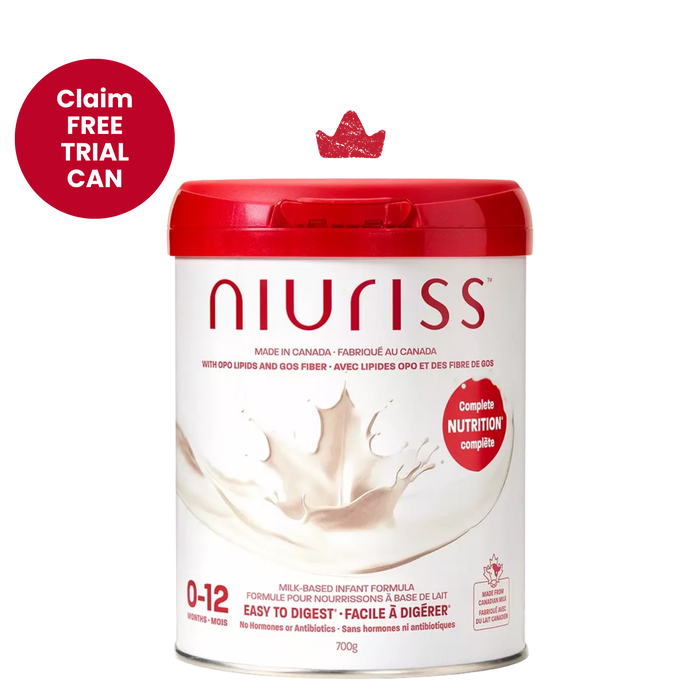

Probiotics for Babies: Gentle Digestion & Strong Immunity
Written by Leena Tabaja. Customer Service Coordinator & proud mom of two.
Ensuring your baby gets the right nutrients is essential for their growth and development- but it’s not just about vitamins and minerals. A healthy gut plays a crucial role in digestion, immunity, and overall well-being, and can be especially important for babies who experience gas, fussiness, and digestive discomfort.
That is where probiotics come in. These beneficial bacteria help balance the gut microbiome, support digestion, and may even ease common infant discomforts like gas and colic. Let’s explore why probiotics matter for babies, how they work, and how to choose the right one for your little one.

What are probiotics?
Probiotics are live microorganisms- often called "good bacteria", that help maintain a balanced digestive system. While adults commonly get probiotics from fermented foods like yogurt and kefir, infants rely on breast milk and formula to develop a healthy gut microbiome.
However, some babies may benefit from additional probiotic support, especially if they experience digestive issues. Probiotics help balance their gut microbiome and promote smoother digestion.
Benefits of Probiotics for babies:
1. Easing Digestive discomfort & Colic
Since newborns have developing digestive systems, they may experience discomfort from gas, constipation, or bloating. Many parents turn to probiotics to support their baby’s digestion, especially when dealing with common concerns like fussiness and colic.
Colic is a common concern, characterized by prolonged crying and fussiness, often linked to digestive discomfort. While the exact cause is not always clear, research suggests that an imbalance in gut bacteria may play a role. Studies have shown that certain probiotic strains, such as Lactobacillus reuteri, may help reduce crying time and alleviate symptoms in colicky infants.
Beyond colic, many babies struggle with gas and bloating, which can be especially uncomfortable after feedings. Probiotics have been studied for their role in easing gas-related discomfort by balancing the gut microbiome, improving digestion, and reducing inflammation.
![]() 2. Strengthening the Immune System
2. Strengthening the Immune System
Did you know 70% of the immune system is in the gut? A healthy gut microbiome plays a key role in immune development, helping babies fight infections and build resilience against common illnesses. Probiotics support this process by promoting beneficial bacteria and reducing harmful microbes. While many babies naturally develop a balanced gut microbiome, parents may consider supplementation if their baby was born via C-section, has taken antibiotics, or experiences frequent digestive issues.
In addition to supporting overall immune health, certain strains of probiotics, like Lactobacillus reuteri, have been shown to help reduce the risk and severity of conditions like eczema and cow's milk protein allergy. By influencing the immune system’s response and modulating inflammation in the gut, probiotics may help prevent or alleviate allergic reactions and inflammatory conditions in babies. This makes probiotics a valuable tool not only for digestive health but for strengthening the immune system against common immune-related issues.
3. Restoring gut balance after antibiotics
Antibiotics are sometimes necessary to treat infections, but they can also disrupt the natural balance of gut bacteria, leading to issues like diarrhea and digestive discomfort.
Probiotics help restore this balance by replenishing good bacteria, reducing the risk of antibiotic-related digestive problems in babies.

Choosing the Right Probiotic for your Baby
Probiotics are generally safe for healthy infants and can support digestion and immune health. However, parents should consult a pediatrician before introducing probiotics, especially for premature babies or those with health conditions.
Not all probiotics are created equal. When selecting a probiotic for your baby, consider the following:
✔ Clinically Studied Strains – Look for probiotics that have been researched specifically for infants, such as Lactobacillus reuteri.
✔ Easy to Administer – Drops or powders that can be added to milk or formula simplify probiotic supplementation.
✔ Quality & Safety – Choose a brand that meets high safety and quality standards.

A Trusted Probiotic Option: BioGaia
For parents considering probiotics, BioGaia is a clinically studied option containing Lactobacillus reuteri, a strain known to support digestion, ease colic symptoms, and promote gut health in infants.
Key Benefits:
✔ Clinically proven to reduce colic symptoms and crying episodes
✔ Supports a balanced gut microbiome for healthy digestion
✔ Helps strengthen the immune system
✔ Easy-to-use drops that can be added to milk or formula
Probiotics & Prebiotics: A Powerful Duo for Infant Gut Health
While probiotics are beneficial bacteria that support gut health, prebiotics are the essential nutrients that help them thrive. While some formulas include added probiotics, Niuriss contains prebiotics, known as GOS (galacto-oligosaccharides), to help create a healthy gut environment for your little one. This type of prebiotic is known to nourish good bacteria as well as support digestion and immune function.
Stay tuned for our next blog, where we’ll dive deeper into prebiotics and their role in infant nutrition!

Power of Probiotics
Probiotics can play an essential role in your baby’s digestive health, immune function, and overall well-being. Whether your little one struggles with colic or digestive discomfort or is taking antibiotics, introducing a high-quality probiotic like BioGaia can help restore balance and provide relief.
If you're considering probiotics for your baby, consult your pediatrician to ensure it's the right choice.

Leena Tabaja
Customer Service Coordinator
& proud mom of two




